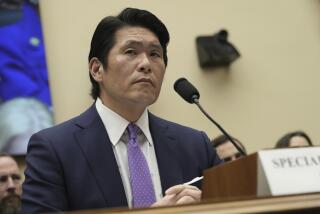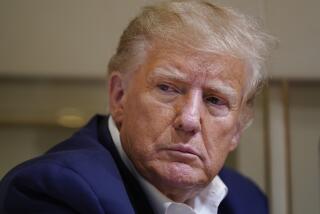Inouye Backs Off on Memo on Diversions
- Share via
WASHINGTON — The chairman of the Senate Iran- contra investigative panel, facing a White House denial and angry Republicans in Congress, on Monday backed off an earlier suggestion that a newly disclosed memorandum indicates that President Reagan was briefed on the uses of diverted profits from arms sales to Iran.
The initial statement by Sen. Daniel K. Inouye (D-Hawaii), made in a Sunday television interview, prompted President Reagan’s spokesman to tell reporters Monday that reports of the memorandum were “totally inaccurate” and that Reagan was never told of the diverted arms money, some of which financed a secret weapons airlift to the Nicaragua rebels. Reagan has consistently said he knew nothing of the diverted money or of the arms airlifts.
Senator Cited Briefing
Inouye, appearing Sunday on CBS’ “Face the Nation,” made national headlines after stating that former National Security Adviser John M. Poindexter last year apparently briefed Reagan on a memo that refers to “using the residual” profits from the Iran arms sales “for other covert activities.”
But, on Monday, when confronted by Rep. Dick Cheney (R-Wyo.) and Sen. James A. McClure (R-Ida.), members of the panel, Inouye conceded that it is “correct” that the memo does not specifically refer to diverted or residual money in its discussion of the secret activities.
Inouye said the final word on the issue must await testimony later this week by Rear Adm. Poindexter, who indicated in writing on the document that he had briefed Reagan on its contents. “We will have to wait until the admiral gives us an answer,” Inouye said.
White House spokesman Marlin Fitzwater said Reagan “had never been briefed on diversion of funds or any excess funds . . . . I’m talking about any or all funds” from the arms sales.
Fitzwater said the memo, dated Sept. 15, 1986, “never mentions diversions or residuals.” He refused to say whether Reagan was actually briefed on the classified memo, which reportedly describes covert operations planned jointly by the United States and Israel.
Although the memorandum does not specifically state so, the projects apparently were to be financed in part with profits from the Iran arms dealings.
The brouhaha underscored the importance of the appearance by Poindexter, who, with the death last May of CIA Director William J. Casey, may be the only person who can state first-hand how much the President knew about secret arms sales to Iran and the contras.
Lawmakers familiar with the 20 hours of closed questioning of Poindexter by congressional investigators have said that they do not expect the admiral to directly tie Reagan either to the diversion of Iran arms profits to the contras or to Lt. Col. Oliver L. North’s secret arms airlifts to the rebels.
But associates suggest that Poindexter will implicate other senior Reagan Administration figures in the operations and provide a wealth of details on North’s wide-ranging activities. His testimony could include new information on North’s and Casey’s efforts to establish a private enterprise to conduct covert projects without congressional approval.
Tower Panel’s Conclusions
Documents released last week by the House and Senate Iran-contra panels bolster last winter’s conclusion by the presidentially appointed Tower Commission that Poindexter was aware of most, if not all, of North’s day-to-day activities.
The Tower report suggested that Poindexter acted almost as North’s spymaster, ordering him to invent cover stories and sever contact with other Administration officials to preserve the secrecy of his missions.
But it remains unclear what Poindexter told his boss, President Reagan, about North’s activities in Central America and Iran.
Poindexter is said to have kept meticulous notes on his activities, but it is not known whether those notes have been recovered.
As principal White House adviser on national security affairs, Poindexter met daily with Reagan and former White House Chief of Staff Donald T. Regan to discuss diplomatic and military matters. Also, he met each Thursday with Casey or his top assistant, Deputy CIA Director Robert M. Gates, to review intelligence issues.
Among key questions to be answered are how much Poindexter and Casey coordinated their own roles in the Iran-contra affair and whether they conspired to keep the operations secret from their superiors or vied to be put in charge of them.
Poindexter may also be able to outline the roles played by other top White House aides in North’s activities, beginning with that of Atty. Gen. Edwin Meese III. A computer message from Poindexter to North indicates that the admiral “talked to Ed twice today on this, and he is still trying to figure out what to do. He is one of the few besides the President that I can trust.”
Shortly before he resigned his White House post last November, Poindexter had a private conversation with Meese in which no notes were taken.
In addition, Poindexter should be able to describe what occurred to the five or six memoranda, each outlining a plan to divert Iran arms profits to the contras, that North has testified he sent to Poindexter last year.
North has said he had “assumed” that at least three of the memos reached Reagan, but he added that Poindexter later told him that Reagan did not know of the diversion.
Monday’s flap over the document stemmed from remarks made by Inouye on the interview program, in which he said the memo “does not speak of diverting the residual (profits) for use of the contras” but refers to “using the residual for other covert activities.”
Inouye characterized the document as saying that Poindexter “briefed the President, the President agrees on the use of these residuals . . . for other covert activities.”
Fitzwater on Monday called that “totally inaccurate,” adding: “There is no way, from reading that memo, that you can conclude that it discusses diversions or residuals.”
The memorandum had been prepared for a briefing given to Reagan last September before a visit by then-Prime Minister Shimon Peres of Israel.
Inouye’s comments were criticized Monday by Republican members of the House and Senate committees investigating the Iran affair. He defended his discussion of the document on CBS.
“This was put out clearly yesterday to make it very clear to the Administration that they will have to answer this,” Inouye said in the hearing. “I did not want to suddenly thrust this in their faces.”
Fitzwater discussed the memo with reporters aboard Air Force One as the President traveled to Indiana to meet with local officials in the small town of Danville. Reagan later addressed the annual convention of the National Assn. of Counties, meeting nearby in Indianapolis.
In his speech to about 4,000 county officials--one of several that Reagan is delivering around the country this summer to seek support for his economic program--the President made only a passing reference to the hearings.
“I have been accused in recent days of campaigning for our ‘economic bill of rights’ in order to distract attention from other events in Washington,” he said. “The truth is just the other way around. There are those who would like to distract attention from the real business of government: putting an end to unrestrained spending.”
Staff writer Doyle McManus contributed to this story.
More to Read
Get the L.A. Times Politics newsletter
Deeply reported insights into legislation, politics and policy from Sacramento, Washington and beyond. In your inbox twice per week.
You may occasionally receive promotional content from the Los Angeles Times.










